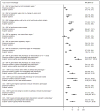Importance of different types of prior knowledge in selecting genome-wide findings for follow-up
- PMID: 23307621
- PMCID: PMC3725558
- DOI: 10.1002/gepi.21705
Importance of different types of prior knowledge in selecting genome-wide findings for follow-up
Abstract
Biological plausibility and other prior information could help select genome-wide association (GWA) findings for further follow-up, but there is no consensus on which types of knowledge should be considered or how to weight them. We used experts' opinions and empirical evidence to estimate the relative importance of 15 types of information at the single-nucleotide polymorphism (SNP) and gene levels. Opinions were elicited from 10 experts using a two-round Delphi survey. Empirical evidence was obtained by comparing the frequency of each type of characteristic in SNPs established as being associated with seven disease traits through GWA meta-analysis and independent replication, with the corresponding frequency in a randomly selected set of SNPs. SNP and gene characteristics were retrieved using a specially developed bioinformatics tool. Both the expert and the empirical evidence rated previous association in a meta-analysis or more than one study as conferring the highest relative probability of true association, whereas previous association in a single study ranked much lower. High relative probabilities were also observed for location in a functional protein domain, although location in a region evolutionarily conserved in vertebrates was ranked high by the data but not by the experts. Our empirical evidence did not support the importance attributed by the experts to whether the gene encodes a protein in a pathway or shows interactions relevant to the trait. Our findings provide insight into the selection and weighting of different types of knowledge in SNP or gene prioritization, and point to areas requiring further research.
© 2013 WILEY PERIODICALS, INC.
Conflict of interest statement
None of the authors declares any conflict of interest.
Figures

Similar articles
-
SNP prioritization using a Bayesian probability of association.Genet Epidemiol. 2013 Feb;37(2):214-21. doi: 10.1002/gepi.21704. Epub 2012 Dec 26. Genet Epidemiol. 2013. PMID: 23280596 Free PMC article.
-
A powerful hybrid approach to select top single-nucleotide polymorphisms for genome-wide association study.BMC Genet. 2011 Jan 6;12:3. doi: 10.1186/1471-2156-12-3. BMC Genet. 2011. PMID: 21211033 Free PMC article.
-
Using prior information from the medical literature in GWAS of oral cancer identifies novel susceptibility variant on chromosome 4--the AdAPT method.PLoS One. 2012;7(5):e36888. doi: 10.1371/journal.pone.0036888. Epub 2012 May 25. PLoS One. 2012. PMID: 22662130 Free PMC article.
-
Methods for meta-analyses of genome-wide association studies: critical assessment of empirical evidence.Am J Epidemiol. 2012 Apr 15;175(8):739-49. doi: 10.1093/aje/kwr385. Epub 2012 Mar 16. Am J Epidemiol. 2012. PMID: 22427610 Review.
-
Prioritization of candidate SNPs in colon cancer using bioinformatics tools: an alternative approach for a cancer biologist.Interdiscip Sci. 2010 Dec;2(4):320-46. doi: 10.1007/s12539-010-0003-3. Epub 2010 Dec 12. Interdiscip Sci. 2010. PMID: 21153778 Review.
Cited by
-
Genome-wide association study of coronary artery calcified atherosclerotic plaque in African Americans with type 2 diabetes.BMC Genet. 2017 Dec 8;18(1):105. doi: 10.1186/s12863-017-0572-9. BMC Genet. 2017. PMID: 29221444 Free PMC article.
-
Genome-wide association study for time to failure of kidney transplants from African American deceased donors.Clin Transplant. 2020 Jun;34(6):e13827. doi: 10.1111/ctr.13827. Epub 2020 Apr 25. Clin Transplant. 2020. PMID: 32080893 Free PMC article.
-
A review of post-GWAS prioritization approaches.Front Genet. 2013 Dec 9;4:280. doi: 10.3389/fgene.2013.00280. Front Genet. 2013. PMID: 24367376 Free PMC article. Review.
-
iFunMed: Integrative functional mediation analysis of GWAS and eQTL studies.Genet Epidemiol. 2019 Oct;43(7):742-760. doi: 10.1002/gepi.22217. Epub 2019 Jul 22. Genet Epidemiol. 2019. PMID: 31328826 Free PMC article.
-
SNP prioritization using a Bayesian probability of association.Genet Epidemiol. 2013 Feb;37(2):214-21. doi: 10.1002/gepi.21704. Epub 2012 Dec 26. Genet Epidemiol. 2013. PMID: 23280596 Free PMC article.
References
-
- Adler M, Ziglio E. Gazing into the oracle: the Delphi method and its application to social policy and public health. London: Jessica Kingsley; 1996.
-
- Aerts S, Lambrechts D, Maity S, et al. Gene prioritization through genomic data fusion. Nat Biotechnol. 2006;24:537–44. - PubMed
Publication types
MeSH terms
Grants and funding
LinkOut - more resources
Full Text Sources
Other Literature Sources

